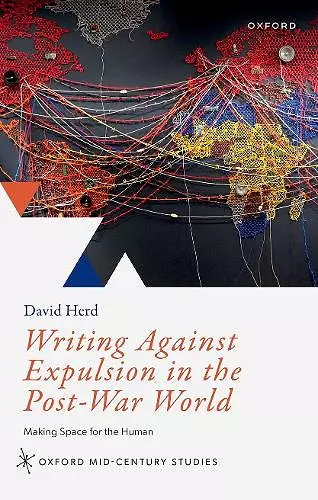Writing Against Expulsion in the Post-War World
Making Space for the Human
Format:Hardback
Publisher:Oxford University Press
Published:28th Sep '23
Currently unavailable, and unfortunately no date known when it will be back

Writing Against Expulsion in the Post-War World: Making Space for the Human tells a pre-history of the Hostile Environment. The book's starting point is the rapidly escalating use of detention as a response to human movement and the global production of geopolitical non-personhood in which detention results. As a matter of urgency, the book argues, we need to understand what is at stake in such policies and to resist the world we are making when we detain and expel. Writing Against Expulsion returns to a post-war period when the brutal consequences of the politics of expulsion were visible and when it was clear to writers of all kinds that space for the human had to be made. Drawing on contemporary histories of forced displacement, eye witness accounts, international legal documents, and on a range of emblematic cross-disciplinary texts and authors — the Universal Declaration of Human Rights, the political philosophy of Hannah Arendt, the poetry of Charles Olson, the revolutionary theory of Frantz Fanon — the book shows how mid-century writers both documented the lived experience of expulsion and asserted ways of thinking and acting by which expulsion could be prevented. What emerged were new languages of rights and recognition — new accounts of Moving, Making and Speaking — through which the exclusions of nation and border could be countered.
Writing against Expulsion in the Post-War World is a timely and politically urgent study that connects postwar experiences of forced displacement and mass migration with our contemporary moment. Herd traces an important history of the "geopolitical non-person"—a dehumanized individual whose essential rights have been suspended. Reading poetic and philosophical works by Charles Olson, Hannah Arendt, and Frantz Fanon alongside first-hand accounts, government policies, and the Universal Declaration of Human Rights, Herd makes a powerful case for the relevance of literary analysis to real-life legal and political dilemmas. Blurring the boundaries between literary scholarship and activism, Herd delivers nothing less than a manifesto against the current political climate where detention, expulsion, and deportation have come to define the very conditions of civic life. * 2024 MSA (Modernist Studies Association) Book Award panel *
Writing Against Expulsion is one of those books that arrives in the world and immediately feels necessary. David Herd asks and brilliantly answers two questions about the condition of unwelcome migrants and the UK government: 'how did we get here' and 'how do we move away from where we are?' Drawing on and building from the works of writers such as Hannah Arendt, Frantz Fanon, the poet Charles Olson, as well as his own work with Refugee Tales, Herd re-casts conversations around 'political non-persons' to allow space for imagination, humanity and truth. A profound and inspiring book. * Kamila Shamsie, author of Home Fire *
Writing Against Expulsion in the Post-War World is a lucid and compelling report on the individual at the mercy of the bureaucracy of immigration control, `the geo-political non-person`, and how the condition of this figure relates to the aftermath of the 1939-45 War and the subsequent moment of decolonisation. It takes us through the political, philosophical and literary contexts with fluency, passion and rigour. Its engagement with the texts through which the argument progresses is extensive and thoroughly persuasive, and allows the reader to witness the personal journey Herd himself travelled in understanding the issues that are the subject of this wonderful and important book. * Abdulrazak Gurnah, Winner of the Nobel Prize in Literature 2021 *
- Winner of Shortlisted for the 2024 MSA (Modernist Studies Association) Book Prize.
ISBN: 9780192872258
Dimensions: 223mm x 140mm x 22mm
Weight: 488g
296 pages